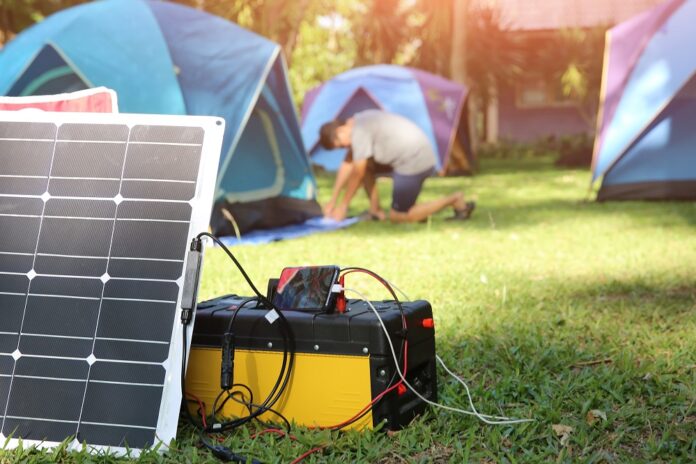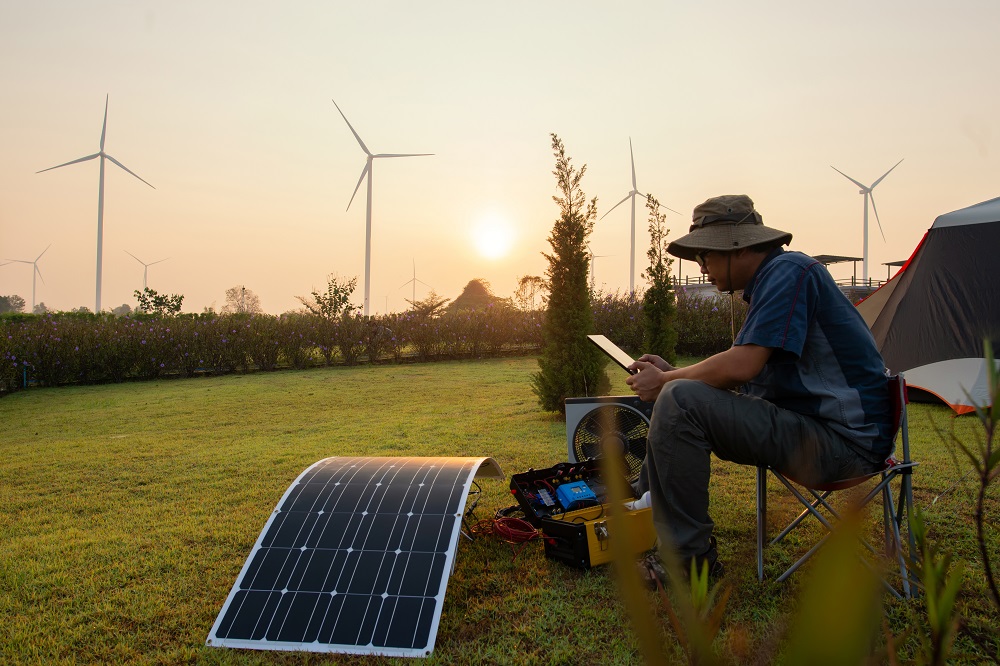While gas and solar generator prices have grown more equal, there are several benefits to going solar. To combat the pollutants in the environment, the globe is increasingly converting to sustainable living.
A portable solar generator may be used as a backup power source if the grid fails. It can also provide energy for camping and boats. But what precisely is a solar powered generator? And how does it stack up against conventional fossil-fuel generators? This post will discuss the information you need to know.
How Does Solar Generator Work?
Battery storage units powered by solar panels are called solar powered generators since they’re portable. This generator collects solar energy via solar panels and stores it in a solar battery. It’s then converted to alternating current (AC power) and used in appliances and other electrical equipment. These three parts work together to form a solar generator.
A solar generator is a battery storage device powered by solar panels that can be taken with you everywhere. You don’t need an electrician for these to be installed and moved to multiple sites, making them an excellent alternative for providing backup power. In case of a power outage and you need a small quantity of energy, they’re the perfect option.
How Solar Powered Generator Contributes To Sustainable Living
Sustainable development meets current demands without putting into risk the future generations’ capacity to fulfill their own. Because it may be utilized continuously without compromising future supply, solar energy epitomizes the term ‘sustainability.’
According to the World Coal Association, over 41% of coal is used to create power, making it one of the most regularly utilized forms of energy generation. Since fossil fuels are one of the most frequent energy sources, the Earth is heavily dependent on them. But it’s also a factor in the alarming rate of global warming and the resulting greenhouse gas emissions.
Compared to fossil fuels, solar energy has a longer lifespan and is less harmful to the environment. It uses the world’s most abundant and long-lasting energy source—sunlight—to generate electricity. Aside from helping reduce carbon emissions, solar energy may serve many other purposes outside those related to generating power.
Other Benefits Of Solar Powered Generators
Here are the other benefits of solar powered generators aside from sustainable living:
- A gasoline generator has a lot of maintenance concerns. You never have to change spark plugs, air filters, or fuel switches with a solar generator.
- There are no moving components in solar generators. They’re able to operate at a low level of noise. Generator noise is the last thing you need while you’re trying to concentrate or unwind.
- The energy generated by solar powered generators isn’t produced by burning fuel. To avoid contaminating the environment, they don’t have any emissions. Therefore, there’s no pollution associated with them.
- The cost of recharging may be free since the energy comes from the sun rather than traditional expensive gasoline. You can get the benefits of solar power by putting up your panels.
- A solar generator may be utilized as a power source in the event of rolling blackouts or if a power line goes down in your neighborhood.
- In the case of solar powered generators, there’s no need to stock up on gasoline or spare components. These may be recharged using a standard household outlet.
Things To Consider When Buying Solar Powered Generators
Estimate how much electricity you need to operate appliances, tools, and equipment in case of a power outage or anything you’ll need before buying a solar powered generator. Also, search for a generator with the proper weight, size, and outputs. Remember that not all solar generators are equal.
Here are some factors to consider while choosing a solar powered generator:
- You need to consider the battery capacity. Measure how much power it can store. Their power rating is also essential to know. To put it another way, batteries with higher capacity and lower power ratings will undoubtedly produce less power, but they’ll last longer. To measure the entire amount of electricity produced or used in an hour, you should always use the watt and watt-hour.
- Although some generators come equipped with solar panels, some require that you buy them separately. Three typical kinds of solar panels are polycrystalline solar cells, monocrystalline panels, and thin films. Monocrystalline panels are the most common and efficient. However, thin panels are the lightest and the most cost-effective option.
- Are you going to use your generator while traveling? If that’s the case, think about the weight of your equipment. Look for features that make it easier to carry such as a smaller weight and an easy-to-grasp handle.
- If you know the battery capacity, the next thing to consider is the battery types. Some of the most popular batteries are lithium-ion and lead-acid. On one hand, lead-acid batteries are better suited to heavy power machinery such as vehicles. Meanwhile, lithium-ion batteries are costlier and also have a greater capacity for energy storage.
- As a general rule, look for a charge controller with three-point tracking. This will regulate solar panels and batteries. These convert the solar panel’s direct current (DC) to alternating current (AC). They’re integrated within the solar panels. The most efficient inverter, the pure sine wave inverter, is also the costliest.
- Lastly, suppose you’re looking for solar panel options. In that case, you need to know that those used in solar powered generators are different from those on roofs and in solar farms. You can shift panels around to get the most sun exposure with solar generators since they’re smaller in size and power.
Takeaway
Using a solar powered generator may help you reduce your carbon footprint as the globe transitions to a more sustainable lifestyle. In the event of a power outage, it’s time to move to solar powered generators. Say goodbye to fluctuating gas prices from using other generators. Because solar powered generators don’t produce any pollutants, this clean, renewable energy source reduces the environmental footprint. Consider the ideas mentioned here as you look for a generator that’s suitable for your home.



















